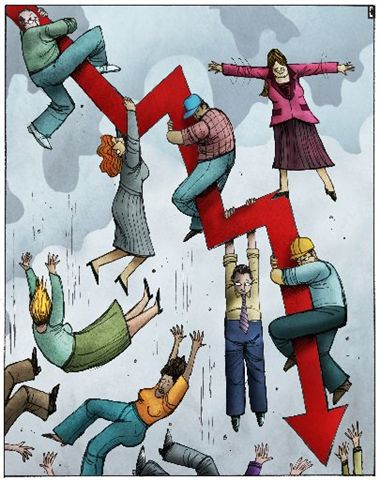Journalism is a busin
 ess, and like any money-driven entity, it ultimately works in the interest of making financial gain. So when the economy takes a turn for the worst, it puts extra strain on reporters - especially beginning reporters. The journalism world has seen its employment being slashed more devastatingly than many other professions, and it's beginning to show. According to what Mike Berezowsky told our journalism class, there are now fewer journalists attending press conferences at the Provincial Parliament buildings than there were a few years ago. The amount of media coverage around the world is increasing while the number of journalists covering it is diminishing. These financial realities cause major dilemmas for news agencies, and they are looking to use new forms of media to reciprocate the effect of economic recession.
ess, and like any money-driven entity, it ultimately works in the interest of making financial gain. So when the economy takes a turn for the worst, it puts extra strain on reporters - especially beginning reporters. The journalism world has seen its employment being slashed more devastatingly than many other professions, and it's beginning to show. According to what Mike Berezowsky told our journalism class, there are now fewer journalists attending press conferences at the Provincial Parliament buildings than there were a few years ago. The amount of media coverage around the world is increasing while the number of journalists covering it is diminishing. These financial realities cause major dilemmas for news agencies, and they are looking to use new forms of media to reciprocate the effect of economic recession. In many cases, what were previously print-based publications have now turned completely to online content. An article by the 24/7 Wall Street website contended that the trend of dying newspapers in print format will only continue in the next few years. Print newspapers all around North America have already faltered according to the article, and many more are to come. But the issue goes deeper than just saving money on publishing content. While it is the cheapest option for publishing the news, advertisers are less likely to pay for online advertisements because there is less stability in readership on the web. With options like RSS feeds and Google News, many readers aren't likely to visit a website's home page. As Jayme Hagen commented in his blog post, " No longer can journalists rely on people coming to them for information or news updates. Journalists must go to the consumer." Subsequent to the implementation of RSS feeds and Google News, advertisers are less likely to invest in home page advertisements. The uncertainty of readership on the web mixed with the recent economic downturn has caused major difficulty for the newspaper business.
Entry-level Journalists
So where does this leave entry-level journalists? Well, not in an overly pleasant situation seeing as the screening process for new journalists is tighter than ever. With newspapers hiring fewer employees all the time, we have to be better than ever. It teaches us to be more diligent and thorough in the way we report the news. It should also give us the readiness to jump on new technologies and use them to our advantage. Because news agencies are ultimately looking to gain financially, journalists of today will need to get on board with whatever it is that will save their corporations money; if they don't get on board they'll be left in the dust. Whatever the latest technology, we must embrace it. As competitiveness and new media change the face of journalism, reporters will be forced to go with the flow - even if it's just to save a buck.
Note: Image from Gaiety Acting website

Thanks Jesse: always great to be reminded of the daunting task of starting out, let alone making significant advances in our careers. Even so, perceptive observations on the state of the industry.
ReplyDelete